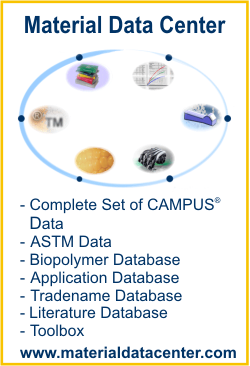Material Data Center is a leading international information system for the plastics industry. Material Data Center offers a comprehensive plastics database, calculation tools, CAE interfaces, a literature database and an application database. For more information about Material Data Center visit www.materialdatacenter.com.
This is the free Material Data Center Datasheet of Ultramid® A3L HP BK20465 - PA66 - BASF
unit conversion, PDF datasheet print, comparison with other plastics, snap fit calculation, beam deflection calculation, CAE Interfaces
Check here, which other Ultramid A datasheets, application examples or technical articles are available in Material Data Center
Typical applications include fasteners and clamps.
| Propiedades mecánicas | Seco / Cond | Unidades | Método de ensayo | ||||||||||||||||||||||||||||||||||||||||||||||||||||||||||||||||||||||||||||||||||||||||||||||||
| ISO Data | |||||||||||||||||||||||||||||||||||||||||||||||||||||||||||||||||||||||||||||||||||||||||||||||||||
| Módulo de tracción | 2430 / 1370 | MPa | ISO 527 | ||||||||||||||||||||||||||||||||||||||||||||||||||||||||||||||||||||||||||||||||||||||||||||||||
| Esfuerzo de fluencia | 63 / 44 | MPa | ISO 527 | ||||||||||||||||||||||||||||||||||||||||||||||||||||||||||||||||||||||||||||||||||||||||||||||||
| Alarg. en límite elástico | 6.2 / 25 | % | ISO 527 | ||||||||||||||||||||||||||||||||||||||||||||||||||||||||||||||||||||||||||||||||||||||||||||||||
| Alarg. nominal a rotura | 28 / >50 | % | ISO 527 | ||||||||||||||||||||||||||||||||||||||||||||||||||||||||||||||||||||||||||||||||||||||||||||||||
| Resistencia al impacto Charpy, +23°C | N / N | kJ/m² | ISO 179/1eU | ||||||||||||||||||||||||||||||||||||||||||||||||||||||||||||||||||||||||||||||||||||||||||||||||
| Resistencia al impacto Charpy, -30°C | N / N | kJ/m² | ISO 179/1eU | ||||||||||||||||||||||||||||||||||||||||||||||||||||||||||||||||||||||||||||||||||||||||||||||||
| Resistencia al impacto Charpy c/entalla, +23°C | 19 / 28 | kJ/m² | ISO 179/1eA | ||||||||||||||||||||||||||||||||||||||||||||||||||||||||||||||||||||||||||||||||||||||||||||||||
| Resistencia al impacto Charpy c/entalla, -30°C | 14 / 11 | kJ/m² | ISO 179/1eA | ||||||||||||||||||||||||||||||||||||||||||||||||||||||||||||||||||||||||||||||||||||||||||||||||
| Propiedades térmicas | Seco / Cond | Unidades | Método de ensayo | ||||||||||||||||||||||||||||||||||||||||||||||||||||||||||||||||||||||||||||||||||||||||||||||||
| ISO Data | |||||||||||||||||||||||||||||||||||||||||||||||||||||||||||||||||||||||||||||||||||||||||||||||||||
| Temperatura de fusión, 10°C/min | 260 / * | °C | ISO 11357-1/-3 | ||||||||||||||||||||||||||||||||||||||||||||||||||||||||||||||||||||||||||||||||||||||||||||||||
| Estabilidad al calor, 1.80 MPa | 70 / * | °C | ISO 75-1/-2 | ||||||||||||||||||||||||||||||||||||||||||||||||||||||||||||||||||||||||||||||||||||||||||||||||
| Estabilidad al calor, 0.45 MPa | 196 / * | °C | ISO 75-1/-2 | ||||||||||||||||||||||||||||||||||||||||||||||||||||||||||||||||||||||||||||||||||||||||||||||||
| Otras propiedades | Seco / Cond | Unidades | Método de ensayo |
| Densidad | 1100 / - | kg/m³ | ISO 1183 |
| Recomendación para procesamiento Moldeo por inyección | Valor | Unidades | Método de ensayo |
| Temperatura de pre-secado | 60 | °C | - |
| Tiempo de pre-secado | 1 - 2 | h | - |
| Humedad de procesamiento | ≤0.2 | % | - |
| Temperatura de la masa | 288 - 305 | °C | - |
| Temperatura del molde | 60 - 100 | °C | - |
injection molding, Melt temperature, range: 288 - 305 °C
injection molding, Mold temperature, range: 60 - 100 °C
Nylon 66 materials must be properly dried in order to provide parts
with optimum strength and toughness. Nylon 66 materials are
hygroscopic and will become degraded by excessive moisture during the
injection molding process. For unopened bag/box, dry at 140F (60C) for
1-2 hours. For material exposed to the atmosphere, if additional
drying is needed, dry at 150F (66C) or until the moisture level is
between 0.04 - 0.20%.
PROCESSING
Melt Temperature: 288 – 305C (550 – 580F)
Mold Temperature: 60 – 100C (140 – 212F)
Injection Pressure: 35 – 125 MPa (5000 – 18000 psi)
Back Pressure: 0 – 0.35 MPa (0 – 50 psi)
Screw RPM 40 – 80
Screw Compression Ratio:3:1 – 4:1
This product can be processed over a wide range of mold
temperatures; however, for applications where aesthetics are
critical, a mold surface temperature of 60-100C (140-212F)
is recommended.
Injection pressure controls the filling of the part and should
be applied for 90% of ram travel. Packing pressure affects
the final part and can be used effectively in controlling
sink marks and shrinkage. It should be applied and maintained
until the gate area is completely frozen off.
Fast fill rates are recommended to insure uniform melt
delivery to the cavity and prevent premature freezing.
Material Data Center is provided by M-Base Engineering + Software GmbH. M-Base Engineering + Software GmbH assumes no liability for the system to be free of errors. Any decision about the application of materials must be double checked with the producer of this material.
Additional information about this material, like producer contact address, etc. can be found at www.materialdatacenter.com. For access to this extra information a registration is requested. Free online registration is available.













